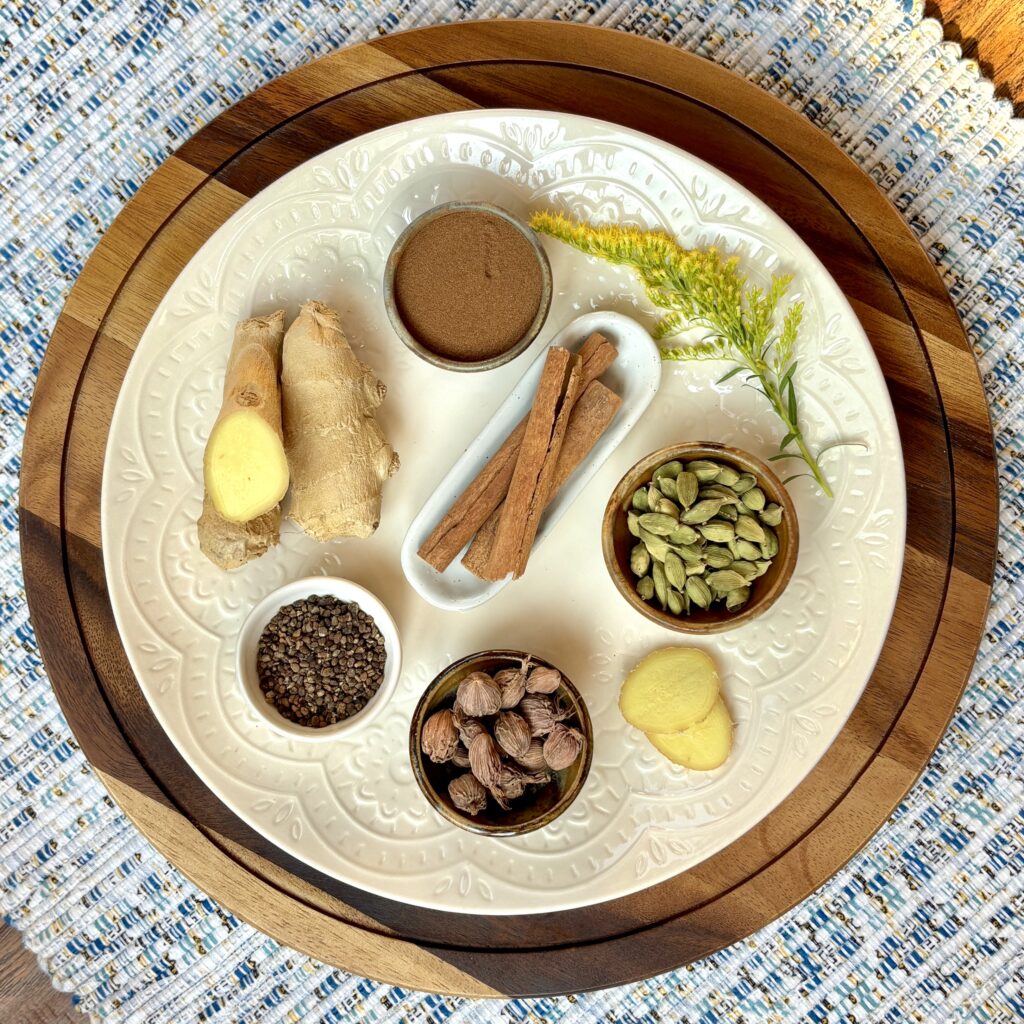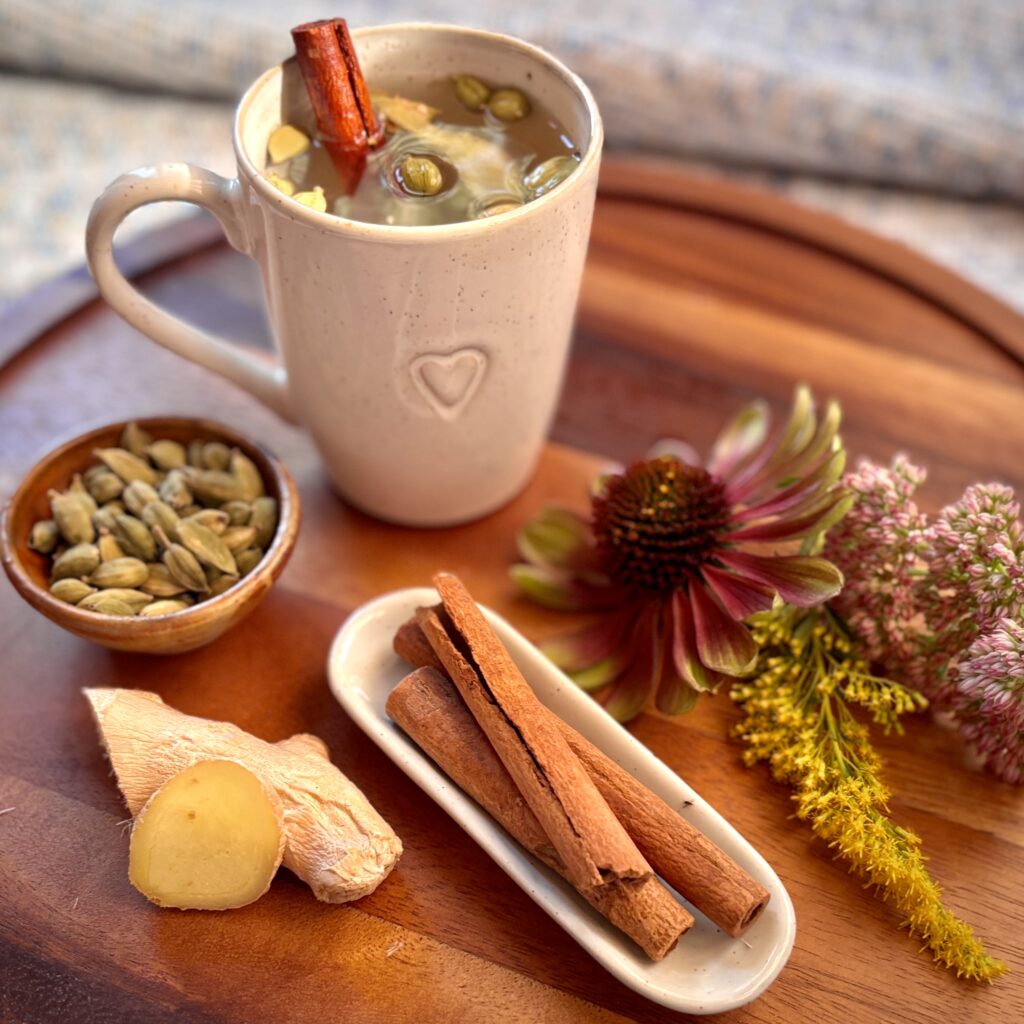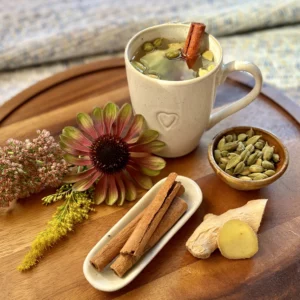In the vibrant world of Ayurvedic healing, the balance of energies is key to maintaining health and well-being. If you’re feeling a little scattered, anxious, or simply out of sorts, it might be a sign that your Vata dosha is in need of some TLC.
Vata characterized by qualities like dryness, coolness, and irregularity, thrives on warmth, nourishment, and grounding. Vata, associated with movement in Ayurveda, governs all forms of motion in the body (including nervous system impulses, circulation, digestion, elimination, and expression) and mind (the movement of thoughts).
Balanced Vata, fosters creativity and adaptability; when Vata becomes imbalanced, it can lead to fear, restlessness and anxiety, highlighting the importance of grounding practices to maintain harmony.
Cinnamon, Ginger and Cardamom to Balance Vata
Enter the dynamic trio of spices: cardamom, ginger, and cinnamon! These flavourful herbs not only tantalize the taste buds but also offer a plethora of benefits that soothe Vata and promote harmony of movement and energy within.
We use these three herbal allies throughout the year, but we especially love to incorporate them into our warm teas and food as we move into the cold, dry, light and ever changing fall weather.
And ginger, cinnamon and cardamom are a gentle and meaningful support as we age and move into the Vata time of life. You can experience how to personalize their uses through Ayurvedic Wellness Coaching.

Cardamom (Elettaria cardamomum)
Ayurvedic Qualities of Cardamom:
- Rasa (Taste): With its sweet and slightly spicy profile, cardamom is like a warm hug for your senses.
- Virya (Potency): Its heating properties help combat the coolness associated with Vata.
- Vipaka (Post-Digestive Effect): Cardamom’s sweet post-digestive effect supports comfort and relaxation.
- Dosha Effect: It beautifully balances Vata and Kapha, while in moderation keeping Pitta in check.
- Aids Samana Vayu: Samana Vayu enhances digestion and assimilation of nutrients, promoting balance and stability within the digestive system.
Cardamom Benefits:
- Enhances assimilation of digestion and alleviates gas and bloating—perfect for those pesky Vata disturbances.
- Acts as a natural breath freshener, making it a delightful companion to any meal.
- Supports respiratory health, easing coughs and promoting clear breathing.
Ginger (Zingiber officinale)
Ayurvedic Qualities of Ginger:
- Rasa: Ginger brings a zesty, pungent kick, invigorating both body and spirit.
- Virya: Its heating potency ignites digestion, perfect for warming Vata’s cold nature.
- Vipaka: Ginger’s sweet post-digestive effect soothes and comforts the stomach.
- Dosha Effect: Primarily balances Vata and Kapha while used in moderation can give Pitta a gentle nudge.
- Supports Apana Vata: Ginger, an underground rhizome, supports Apana Vayu by enhancing downward movement to support grounding of mental energy and effective elimination.
Ginger Benefits:
- A powerful digestive aid, ginger helps relieve nausea and soothe an upset stomach.
- It supports the immune system, making it a must-have during the changing seasons.
- Promotes warmth in the body—ideal for cold winter days when Vata tends to spike.
Take a deep dive into the study and natural healing uses of Ginger through Ayurveda with our Ayurvedic Herb Club Library.
Cinnamon (Cinnamomum verum)
Ayurvedic Qualities of Cinnamon:
- Rasa: With its sweet and spicy allure, cinnamon awakens warmth and joy.
- Virya: Its warming properties are excellent for bolstering digestion and metabolism.
- Vipaka: Sweet in post-digestion, cinnamon cultivates a sense of comfort and satisfaction.
- Dosha Effect: Balances Vata and Kapha while tempering Pitta.
- Energizes Vyana Vayu: Vyana Vayu enhances circulation and the distribution of vital nutrients throughout the body. Cinnamon’s warming properties stimulate blood flow, promoting overall vitality and a sense of well-being, making it especially beneficial for invigorating energy during colder months.
Cinnamon Benefits:
- Improves circulation and supports heart health, giving Vata a cozy boost.
- Has antimicrobial properties, adding an extra layer of protection against seasonal illnesses.
- Helps regulate blood sugar levels, which can stabilize energy and cravings.

Tea Blend Recipe: Cardamom, Ginger, and Cinnamon Tea
Ingredients:
- 1 teaspoon of crushed cardamom pods
- 1 teaspoon of freshly grated ginger
- 1 teaspoon of cinnamon powder or 1 stick of cinnamon
- 2 cups of water
- Honey or maple syrup (optional, for sweetness)
- Lemon (optional, for added freshness)
Instructions:
- Boil Water: In a saucepan, bring 2 cups of water to a boil.
- Add Ingredients: Add the crushed cardamom, grated ginger, and cinnamon (powder or stick) to the boiling water.
- Simmer: Reduce heat and let the mixture simmer for about 10 minutes. This allows the spices to unleash their magic!
- Strain: Remove from heat and strain the tea into your favorite cup.
- Sweeten (Optional): If desired, add honey or maple syrup for sweetness and a squeeze of lemon for brightness.
- Enjoy: Sip and let the warmth envelop you, soothing your Vata and invigorating your spirit!
Easy Ayurvedic Detox: Strengthening Digestion through Removal of Toxins (Ama)
Taking a sip of hot steeped Ginger, Cardamom & Cinnamon Tea every 15 – 30 minutes throughout the day, is an easy and effective way to remove the toxins (ama) that build-up due to poor quality food, water and the effects of compromised digestion.
Try this for health-hack for 2 weeks and you will notice the benefits of improved digestion such as better elimination, reduced bloating, gas, heaviness and reduced aches and pain.
Ayurvedic Balance with Cinnamon, Ginger and Cardamom
This delightful tea blend of cardamom, ginger, and cinnamon offers not just a flavour explosion, but also a treasure trove of benefits to nurture your Vata dosha.
Ginger primarily supports Apana Vata, promoting digestion and elimination. Cardamom aids in balancing Samana Vata, enhancing digestion and assimilation of nutrients. Cinnamon supports Vyana Vata and Prana Vata, promoting warmth and circulation, which can help invigorate the body and mind. Together, they create a harmonious blend that nurtures multiple aspects of Vata energy.
Together, they create a symphony of warmth and comfort that helps ground the cold, dry airy qualities of Vata, easing anxiety, harmonizing variable digestion and promoting strength and balance.
So, whether you’re facing a hectic day or simply seeking a moment of tranquility, we love to brew a cup of this enchanting tea and let its healing properties uplift and restore. Here’s to savouring every sip and embracing the warmth within!
Learn more about how to understand and balance your personal doshas with Ayurvedic Wellness Coaching!



